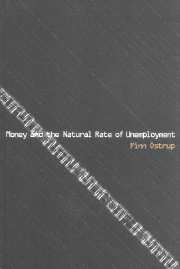Book contents
- Frontmatter
- Contents
- Preface
- Part I Introduction and main assumptions
- Part II The impact of monetary policy and inflation
- Part III The impact of monetary regimes
- 9 Centralised wage formation
- 10 Fiscal policy
- 11 Price stability goal
- 12 Uncertainty concerning policy formation
- 13 Policy uncertainty in a fixed-but-adjustable exchange rate regime
- 14 The impact of uncertainty on wage setting
- Part IV Policy implications
- Appendix: Microeconomic foundations
- Bibliography
- Index
13 - Policy uncertainty in a fixed-but-adjustable exchange rate regime
Published online by Cambridge University Press: 22 September 2009
- Frontmatter
- Contents
- Preface
- Part I Introduction and main assumptions
- Part II The impact of monetary policy and inflation
- Part III The impact of monetary regimes
- 9 Centralised wage formation
- 10 Fiscal policy
- 11 Price stability goal
- 12 Uncertainty concerning policy formation
- 13 Policy uncertainty in a fixed-but-adjustable exchange rate regime
- 14 The impact of uncertainty on wage setting
- Part IV Policy implications
- Appendix: Microeconomic foundations
- Bibliography
- Index
Summary
Introduction
This chapter examines natural production in a fixed-but-adjustable exchange rate system in which there is uncertainty regarding the authorities' decision on exchange rate adjustments. Based on Obstfeld (1991, 1994, 1996), the point of departure is taken in the hypothesis that exchange rate adjustments are determined by the authorities' preferences with respect to unemployment. Depending on the costs associated with devaluation, the authorities are tempted to devalue when there is a large difference between actual unemployment and desired unemployment. Wage setters set the nominal wage in advance through contracts, corresponding to Kydland and Prescott (1977) and Barro and Gordon (1983a).
It is assumed that wage setters are unable to foresee the authorities' exchange rate decision with certainty even though they have correct knowledge about the economic structure and thus also about the shocks and the unemployment level which will be realised in the course of the wage contract period. We assume that exchange rate adjustment results from a political decision-making process which cannot be foreseen with certainty. At each given point in time, the probability of an exchange rate adjustment depends on the unemployment level and on the authorities' preferences. The wage setters attach correct probabilities to the authorities either maintaining an unchanged exchange rate or undertaking an exchange rate adjustment in the course of the wage contract period.
It is a main conclusion from the analysis that the authorities' preferences affect production when there is a decentralised wage formation.
- Type
- Chapter
- Information
- Money and the Natural Rate of Unemployment , pp. 225 - 239Publisher: Cambridge University PressPrint publication year: 2000



